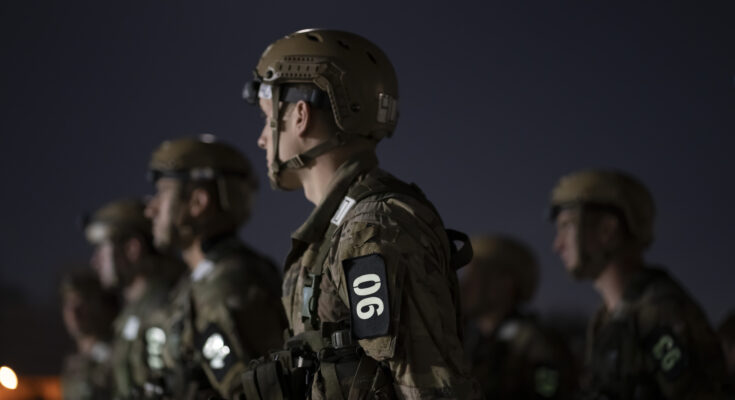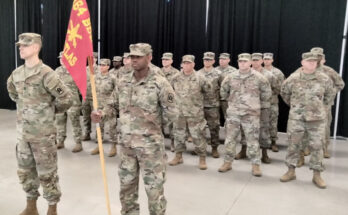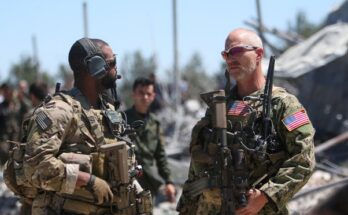United States Special Operations Command Recruitment: In the vast spectrum of the United States military, the United States Special Operations Command (USSOCOM) stands out as a vital component, ensuring national security and executing specialized missions globally.
Established in 1987, USSOCOM orchestrates the readiness of special operations forces from various military branches, bringing together elite professionals trained for high-risk, high-reward scenarios.
The strength of USSOCOM isn’t just in its sophisticated equipment or advanced training techniques, but primarily in its personnel. Hence, recruitment plays a paramount role. Identifying, attracting, and onboarding the right individuals is crucial to maintaining the efficacy and precision of special operations.
These forces require not only physical prowess but also mental fortitude, adaptability, and a range of specialized skills. In this context, understanding the importance of recruitment for special operations forces becomes imperative, as it ensures that the US remains at the forefront of global defense and security measures.
Different Branches within the USSOCOM
The United States Special Operations Command (USSOCOM) is the unified command that oversees several specialized teams and units, each with its distinct mission and recruitment requirements. Here’s a brief overview of these branches and what sets them apart.
Navy SEALs:
- Overview: The Sea, Air, and Land Teams, commonly known as the Navy SEALs, are the U.S. Navy’s primary special operations force. They are trained to operate in all environments but are best known for their maritime operations.
- Role: Conducting direct action warfare, special reconnaissance missions, unconventional warfare, and counter-terrorism operations.
- Recruitment Needs: Candidates typically undergo the notoriously challenging Basic Underwater Demolition/SEAL (BUD/S) training. They must demonstrate exceptional physical fitness, mental resilience, and proficiency in water operations.
Delta Force (1st Special Forces Operational Detachment-Delta):
- Overview: Often considered the Army’s premier counter-terrorism unit, Delta Force remains one of the U.S.’s most secretive special operations groups.
- Role: Hostage rescue, counter-terrorism, and direct action missions. They often work on the most high-risk and sensitive tasks.
- Recruitment Needs: While exact recruitment processes are classified, it’s believed that only the military’s most experienced and capable operators are invited to try out for Delta Force.
Green Berets (U.S. Army Special Forces):
- Overview: Known officially as the Special Forces, the Green Berets have a storied history of working alongside indigenous forces and conducting unconventional warfare.
- Role: Foreign internal defense, special reconnaissance, direct action, and unconventional warfare. They are experts in training and leading guerrilla warfare.
- Recruitment Needs: Candidates undergo the Special Forces Assessment and Selection (SFAS) followed by the Special Forces Qualification Course (SFQC). They must be skilled in languages, cultural understanding, and unconventional warfare techniques.
However, while all these branches fall under USSOCOM, each has its distinct operational focus and recruitment process. Anyone considering a career in these elite groups should be prepared for intense training and a commitment to excellence.
The USSOCOM Recruitment Process
The United States Special Operations Command (USSOCOM) ensures that only the best individuals serve in our specialized forces. If you’re considering joining this elite group, understanding the recruitment process is crucial. Here’s a concise breakdown of what to expect:
1. Basic Requirements for Candidates:
- Citizenship: Applicants must be U.S. citizens.
- Age: Typically, candidates should be between 18 and 28 years of age, but there are some exceptions.
- Physical Fitness: Candidates must meet rigorous physical fitness standards. This often includes passing a Physical Fitness Test (PFT) with specific benchmarks for running, push-ups, and sit-ups.
- Medical Clearance: A comprehensive medical examination ensures candidates are fit for duty.
- Security Clearance: Due to the sensitive nature of the operations, candidates must pass a background check and obtain the necessary security clearances.
- Educational Background: A high school diploma or equivalent is generally required, though some positions may need advanced degrees or specialized training.
2. Phases of the Recruitment Process:
- Application Submission: The journey begins with submitting a detailed application, highlighting your qualifications, training, and experience.
- Initial Screening: This step filters out those who don’t meet the basic requirements.
- Written Test: Candidates might undergo aptitude and knowledge-based tests pertinent to the role.
- Physical Fitness Test (PFT): This rigorous test ensures candidates can meet the demanding physical challenges of the position.
- Interviews: Successful candidates are then interviewed by senior USSOCOM officials or relevant department heads.
- Background and Security Check: An in-depth investigation into the candidate’s history ensures they can be trusted with national security information.
- Training: Upon clearing all previous stages, candidates undergo specialized training tailored to their role within USSOCOM.
- Final Review and Acceptance: After training, there’s a final review where the candidate’s overall performance, fitness, and adaptability are evaluated. Those who excel are formally accepted into USSOCOM.
Considering a role within USSOCOM is no small endeavor, but for those who are committed, the rewards and satisfaction of serving in one of the world’s elite military groups are unparalleled.
Training and Preparation for Recruits
Every recruit, regardless of the military division, undergoes rigorous training; however, for those destined for the United States Special Operations Command (USSOCOM), the bar is set even higher. This segment delves into the crucial aspects of training that these exceptional soldiers endure and what makes it different from regular military training.
The Significance of Basic and Advanced Training
Basic Training: The cornerstone of a soldier’s career, basic training lays the foundation. It involves physical conditioning, weaponry handling, team building, and familiarizing recruits with military protocols. For USSOCOM recruits, it’s about instilling a mindset—teaching them to think critically, react rapidly, and be always prepared for the unpredictable.
Advanced Training: Once the basics are solidified, advanced training takes over. This is where USSOCOM recruits are polished into elite soldiers. It dives deeper into specialized tactics, from covert operations to advanced combat skills. Advanced training ensures that these soldiers can handle any scenario, no matter how demanding.
Special Courses and Programs Unique to USSOCOM Recruits
USSOCOM is distinguished by its specialized courses tailored to foster unique skill sets. Some programs might focus on guerrilla warfare, while others could dive into underwater demolition or survival in extreme conditions. These courses are designed with the intricacies of modern warfare and the challenges of special operations in mind. Each program sharpens the recruits’ skills, preparing them for specialized roles that regular military training doesn’t cover. The takeaway? When a USSOCOM recruit completes their training, they are not just any soldier—they are an elite force ready for the world’s toughest challenges.
Remember, the journey of a USSOCOM recruit is demanding, but the training they receive is unparalleled, ensuring they are well-equipped to protect and serve at the highest level.
Challenges in USSOCOM Recruitment
The United States Special Operations Command (USSOCOM) faces distinct challenges when it comes to recruitment. Given the specialized nature of their operations, their recruitment needs are more demanding than other military units.
1. Current Challenges Faced in Recruitment:
- Maintaining High Standards: USSOCOM units require operators who can perform at the highest physical, mental, and tactical levels. Ensuring consistent intake of such elite individuals is a substantial challenge.
- Meeting Specific Unit Needs: Different units under USSOCOM have varied and unique requirements. From Navy SEALs to Army Rangers, each unit demands specific skill sets and attributes. Tailoring the recruitment process to cater to each unit’s unique needs is a significant hurdle.
2. Strategies USSOCOM Uses to Overcome These Challenges:
- Targeted Advertising: To attract the right candidates, USSOCOM employs targeted advertising campaigns. These campaigns highlight the unique challenges and rewards of a career within special operations, appealing directly to those who fit the bill.
- Partnerships with Educational Institutions: By forming partnerships with schools and colleges, USSOCOM can tap into a pool of potential candidates at an early stage, guiding them towards the requirements and opportunities within the Command.
- Rigorous Selection Process: To ensure only the best get through, USSOCOM uses a multi-phased selection process. This includes rigorous physical tests, mental evaluations, and tactical scenarios to vet the suitability of candidates.
- Continuous Training and Development: Recognizing that not all skills are innate, USSOCOM invests heavily in training. This ensures that even if a recruit is not perfect at the outset, they can be molded into an operator who meets the Command’s exacting standards.
However, while USSOCOM faces unique recruitment challenges due to its specialized needs, they employ a combination of strategies to ensure they onboard only the best and brightest into their ranks.
Benefits of Joining the United States Special Operations Command (USSOCOM)
Joining the ranks of the USSOCOM is not just about serving your nation but also about enhancing your personal and professional life. Let’s delve into some of the compelling advantages:
Career Opportunities and Advancements:
- Diverse Roles: Serving in the USSOCOM provides exposure to a myriad of roles and responsibilities, from intelligence gathering to direct combat roles. This diversity allows for a broadened skill set and paves the way for future career prospects both within and outside the military.
- Continuous Training: USSOCOM is renowned for its rigorous training programs. These not only ensure you’re at the top of your game in the field but also significantly boost your career qualifications.
- Networking: Being a part of this elite group offers unparalleled networking opportunities with some of the best minds in defense and strategy. These contacts can be invaluable throughout one’s career.
Special Benefits and Compensations Unique to USSOCOM Operatives:
- Higher Pay Grades: USSOCOM operatives often enjoy higher pay scales in recognition of their specialized skills and the high-risk nature of their missions.
- Special Duty Pay: On top of the base pay, operatives may be eligible for special duty pay, reflecting the demanding nature of their roles.
- Bonuses: Depending on the assignment, enlistment, and re-enlistment bonuses may be awarded.
- Comprehensive Health and Welfare Benefits: Given the nature of their job, USSOCOM members are afforded some of the best medical and insurance coverage in the military.
- Access to Specialized Resources: From advanced gear and technology to specialized psychological and medical support, the USSOCOM ensures its members are equipped with the best.
By joining USSOCOM, you’re not just embracing a job, but a pathway enriched with growth, prestige, and unparalleled benefits. The journey might be challenging, but the rewards are truly exceptional.
Future of United States Special Operations Command Recruitment
Special Operations Command (USSOCOM) plays a pivotal role in the U.S. defense framework. As global challenges evolve, so too does the need for a robust and adaptive Special Operations recruitment strategy. Here’s what to expect:
Trends and Projections in Recruitment Needs
- Diverse Skillsets: As technological and geopolitical landscapes shift, there’s an increasing demand for operatives with a blend of traditional combat skills and expertise in cyber warfare, linguistics, and cultural studies. The modern operative isn’t just a warrior; they’re a multi-faceted specialist.
- Remote Warfare Proficiency: The rise of drone warfare and cyber operations means that USSOCOM will be seeking recruits who are adept at mastering cutting-edge technologies and remote operational tactics.
- Increased Emphasis on Mental Toughness: The complex nature of modern warfare necessitates operatives who can withstand not just physical but also psychological and informational warfare. As a result, the screening process might lean heavily on assessing mental resilience.
New Initiatives or Changes Expected in the Near Future
- Holistic Training Programs: Anticipate a revamp of training curriculums to create a holistic approach. This will blend physical prowess with cognitive training, ensuring that operatives are as sharp mentally as they are physically.
- Collaborative Recruitment Drives: With the blurred lines between traditional warfare and cyber warfare, USSOCOM might collaborate more closely with agencies like the NSA or Cyber Command to recruit talent with niche skills.
- Digital Outreach: To appeal to the younger, tech-savvy generation, expect USSOCOM to bolster its online recruitment presence. This might include virtual tours, interactive webinars, and a stronger social media footprint.
However, the future of USSOCOM recruitment is set to be as dynamic as the challenges the U.S. faces. As the command adapts, it’s clear that the next generation of Special Operations recruits will be diverse, tech-savvy, and mentally resilient, ready to confront the multifaceted challenges of the 21st century.
Conclusion
In the ever-evolving landscape of global security, the United States Special Operations Command (USSOCOM) Recruitment Programs stand out as paramount. These programs are not just about enlisting individuals; they’re about identifying the best and brightest, those with an unyielding spirit and unparalleled dedication. The essence of USSOCOM is to uphold the nation’s security, and its recruitment endeavors ensure that only the most elite and skilled warriors wear its badge.
If you believe you have what it takes or you’re passionate about supporting the noble cause of USSOCOM, now is your moment. We invite potential recruits to explore the opportunities available, to challenge themselves and be a part of something greater. For those who wish to support USSOCOM in other capacities, know that your contribution, no matter its form, strengthens the shield that protects our nation.
Your journey starts here. Become an integral part of the future of U.S. defense. Join or support USSOCOM today.



